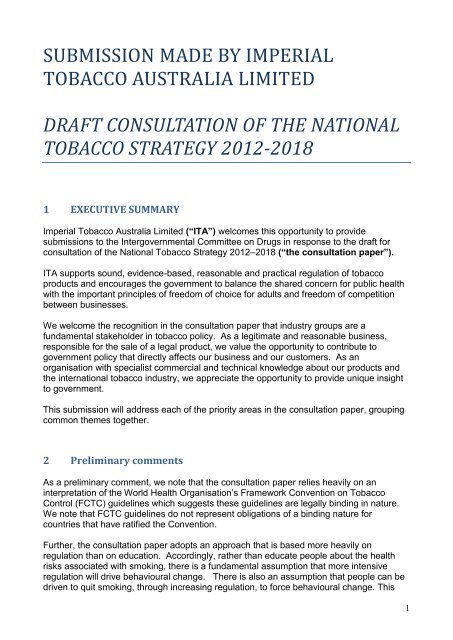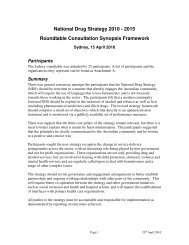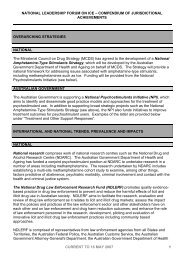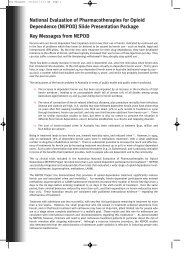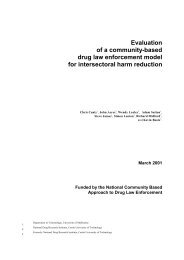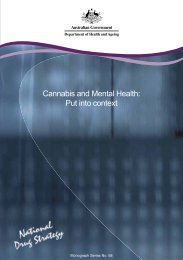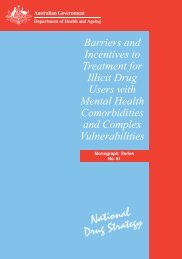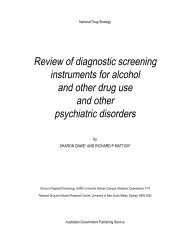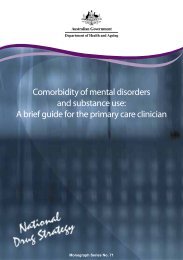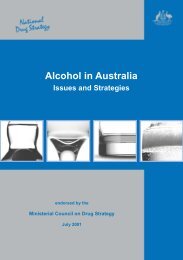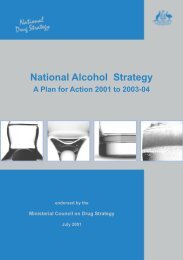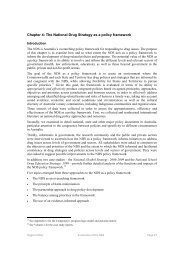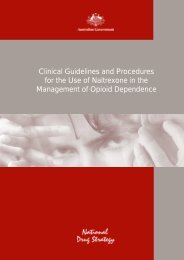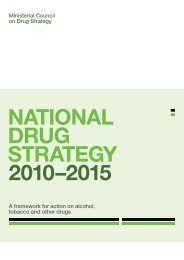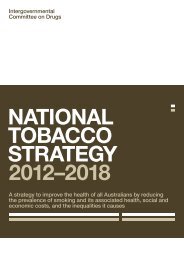Submission by Imperial Tobacco Australia Limited (PDF 600 KB)
Submission by Imperial Tobacco Australia Limited (PDF 600 KB)
Submission by Imperial Tobacco Australia Limited (PDF 600 KB)
Create successful ePaper yourself
Turn your PDF publications into a flip-book with our unique Google optimized e-Paper software.
SUBMISSION MADE BY IMPERIAL<br />
TOBACCO AUSTRALIA LIMITED<br />
DRAFT CONSULTATION OF THE NATIONAL<br />
TOBACCO STRATEGY 2012-2018<br />
1 EXECUTIVE SUMMARY<br />
<strong>Imperial</strong> <strong>Tobacco</strong> <strong>Australia</strong> <strong>Limited</strong> (“ITA”) welcomes this opportunity to provide<br />
submissions to the Intergovernmental Committee on Drugs in response to the draft for<br />
consultation of the National <strong>Tobacco</strong> Strategy 2012–2018 (“the consultation paper”).<br />
ITA supports sound, evidence-based, reasonable and practical regulation of tobacco<br />
products and encourages the government to balance the shared concern for public health<br />
with the important principles of freedom of choice for adults and freedom of competition<br />
between businesses.<br />
We welcome the recognition in the consultation paper that industry groups are a<br />
fundamental stakeholder in tobacco policy. As a legitimate and reasonable business,<br />
responsible for the sale of a legal product, we value the opportunity to contribute to<br />
government policy that directly affects our business and our customers. As an<br />
organisation with specialist commercial and technical knowledge about our products and<br />
the international tobacco industry, we appreciate the opportunity to provide unique insight<br />
to government.<br />
This submission will address each of the priority areas in the consultation paper, grouping<br />
common themes together.<br />
2 Preliminary comments<br />
As a preliminary comment, we note that the consultation paper relies heavily on an<br />
interpretation of the World Health Organisation‟s Framework Convention on <strong>Tobacco</strong><br />
Control (FCTC) guidelines which suggests these guidelines are legally binding in nature.<br />
We note that FCTC guidelines do not represent obligations of a binding nature for<br />
countries that have ratified the Convention.<br />
Further, the consultation paper adopts an approach that is based more heavily on<br />
regulation than on education. Accordingly, rather than educate people about the health<br />
risks associated with smoking, there is a fundamental assumption that more intensive<br />
regulation will drive behavioural change. There is also an assumption that people can be<br />
driven to quit smoking, through increasing regulation, to force behavioural change. This<br />
1
differs significantly from the approach of regulators in other markets, such as the US FDA,<br />
which has adopted an approach more focused on “harm reduction” and acknowledges that<br />
informed adults may want to continue to use tobacco products.<br />
We believe that the decision to enjoy tobacco products is a choice for adults and support<br />
the right of adults to choose to smoke. We do not want children to smoke or to use<br />
tobacco products. We support penalties for retailers who sell tobacco products to children.<br />
3 PARTS 6.1, 6.3 AND 6.4<br />
Priority Areas 1 (Strengthening Social Marketing Campaigns Etc); 3 (Bolstering and<br />
Building On Existing Programs and Partnerships to Reduce Smoking Rates Among<br />
Aboriginal And Torres Strait Islander People); and 4 (Strengthening Efforts To<br />
Reduce Smoking Among People In Disadvantaged Populations With High Smoking<br />
Prevalence)<br />
We recognise that it is the role of government to provide the public with clear and<br />
consistent messages about the health risks associated with smoking. We support<br />
government efforts to inform people of these risks provided that government policy is<br />
supported <strong>by</strong> sound evidence. We oppose any government campaigns aimed at<br />
stigmatising smokers or harassing them into quitting. We believe that such campaigns are<br />
counterproductive, making smokers feel victimised <strong>by</strong> and alienated from the government,<br />
and accordingly, less receptive to government health warnings.<br />
We support government campaigns that focus on the factual statements relating to the<br />
risks associated with smoking in order to enable informed choice <strong>by</strong> adults, rather than<br />
campaigns that seek to impose a view about socially appropriate behaviour and attempt to<br />
mould social norms.<br />
Several of these action areas propose to monitor, analyse and evaluate the impact of<br />
current and/or future initiatives to inform and refine future regulation. We strongly support<br />
efforts to evaluate regulation against evidence-based data. We continue to seek<br />
constructive dialogue with regulatory authorities in order to support reasonable,<br />
proportionate and evidence-based regulations and would like to be involved in establishing<br />
any relevant frameworks.<br />
4 PART 6.2<br />
Priority Area 2: Continuing to Reduce the Affordability of <strong>Tobacco</strong> Products<br />
We note that tobacco products are already subject to taxes much higher than those<br />
imposed on any other consumer products. While the consultation paper claims that high<br />
taxes reduce smoking levels (p 17), there is little evidence to show any direct causal link<br />
between high taxes as an isolated factor and reduced prevalence of smoking. We submit<br />
that a more likely explanation for any causal link is that high taxes reduce sales of legal<br />
products and cause consumers to substitute legal tobacco for illegal alternatives. The<br />
consultation paper asserts that „<strong>Australia</strong> has successfully prevented the emergence of<br />
widespread illicit trade in tobacco as has occurred in some other countries‟. Given the<br />
2
figures set out below, ITA would challenge the accuracy of this statement. Importantly, the<br />
consultation paper also notes that „continued effort is required to prevent an increase in<br />
the availability and use of illicit tobacco products …‟, acknowledging concern that higher<br />
prices may lead consumers to substitute legal products with illegal ones.<br />
There is strong evidence to support the view that there is a direct causal link between<br />
increases in tobacco prices and increases in illicit trade in tobacco. This is due<br />
predominantly to the fact that duty and/or excise are not paid on illicit tobacco products,<br />
making them less than half the price of legal products. A recent report prepared <strong>by</strong><br />
Deloitte states: „The illicit tobacco market in <strong>Australia</strong> for 2011 is estimated to total 2.264<br />
million kilograms of tobacco which is equivalent to 13.4% of the estimated legal tobacco<br />
market … The proportion of survey respondents who reported purchasing illicit tobacco<br />
has increased since 2010.‟ Deloitte‟s tracking of illicit tobacco trade between 2009 and<br />
2012 shows that after a significant tobacco excise increase (25%) in 2010 there was a<br />
statistically significant spike in illicit trade. Subsequently, engagement in illicit trade has<br />
slowly stabilised, correlating with a stabilisation of prices for legal tobacco. ITA fears that<br />
another sharp increase in tobacco excise would result in another spike in the number of<br />
consumers who substitute legal, properly regulated, tobacco products for contraband,<br />
counterfeit or unbranded (loose) tobacco products.<br />
The illicit trade in tobacco significantly undermines a number of public health initiatives<br />
relating to smoking. First, illicit tobacco products have not been manufactured in a<br />
regulated environment, may contain unknown substances and otherwise not comply with<br />
<strong>Australia</strong>n manufacturing requirements (such as Reduced Fire Risk compliance). Second,<br />
the levels of tar, nicotine and other ingredients in cigarettes sold on the black market are<br />
not subject to government regulation or scientific scrutiny. Third, pushing consumers<br />
towards illicit trade exposes them to criminal groups who demonstrate no regard for public<br />
safety and health, rather than encouraging consumers to engage with responsible<br />
manufacturers and retailers. Anecdotal evidence suggests that criminal groups often<br />
supply tobacco to children, who may not represent a profitable market for illicit trade<br />
without the additional adult demand for black market tobacco products. In short, criminals<br />
involved in the manufacture and supply of illicit tobacco products are unaccountable for<br />
their products and their activities, engaging in a range of conduct that is directly conflicting<br />
with the public interest.<br />
Any further increase in excise tax would undermine the work undertaken <strong>by</strong> the industry,<br />
business groups and government authorities to combat illicit trade in tobacco products.<br />
Finally, the illicit trade in tobacco products also undermines the government‟s revenue<br />
raising capabilities as taxes cannot be collected from illegal sellers of cigarettes.<br />
Approximately $1 billion in revenue is lost annually as a result of the tobacco black market<br />
and the livelihoods of many small businesses are put at risk.<br />
The above Deloitte report also demonstrates that consumers have a high level of<br />
awareness of the availability of cheap illicit products. The consultation paper<br />
acknowledges that „[i]n 2010, nearly half of smokers aged 14 years or older had seen or<br />
heard of unbranded loose tobacco known as “chop chop”.‟ The awareness of these<br />
products, and their continued availability, makes the potential for consumers to move to<br />
illicit tobacco as a result of sharp tax increases greater. ITA submits that the government<br />
should be concerned particularly about low income consumers feeling pressure to<br />
substitute expensive legal products with comparatively inexpensive illegal products. Lower<br />
income consumers have higher price elasticity than higher income consumers. The<br />
consultation paper acknowledges this <strong>by</strong> stating that „[o]ver the period January 1999 to<br />
3
December 2006, a one <strong>Australia</strong>n dollar increase in price was associated with a decline in<br />
prevalence of 2.6 per cent among low income groups compared with a 0.2 per cent decline<br />
among high income groups.‟ (p 24). There is no evidence to suggest that these consumers<br />
stopped using tobacco, as opposed to substituting legal tobacco products with illegal<br />
tobacco. High price elasticity means that low income consumers are more likely to<br />
substitute expensive legal cigarettes for cheaper, illegal alternatives. Given that this group<br />
is one of the target areas for health assistance from the government, we submit that the<br />
risk of illegal product substitution is something the government should consider very<br />
seriously before further increasing taxes.<br />
ITA strongly believes that a key area for government policy should be reducing illicit trade<br />
in tobacco. ITA submits that the consultation paper inappropriately emphasises increased<br />
prices of legal products without directing adequate resources to stemming trade in illegal<br />
products. Before any further price-related action is taken in relation to legal tobacco<br />
products, the government should target all available resources towards stemming the<br />
growth of illicit, unregulated tobacco products. An approach targeting the growth of illicit<br />
trade (which is unaccountable for its products and actions), not one further restricting<br />
already accountable legitimate traders is warranted here. This approach would be in line<br />
with the Framework Convention on <strong>Tobacco</strong> Control as well as international best practice.<br />
In addition to these general concerns, there are a number of more specific Part 6 action<br />
items that cause ITA serious concern.<br />
4.1 Action Item 6.2.5<br />
ITA is strongly opposed to minimum pricing or price discounting restrictions, on the basis<br />
that both are anti-competitive. ITA‟s brand portfolio is comprised of many brands which<br />
belong to the “value” sector of the <strong>Australia</strong>n tobacco market. If a minimum price were<br />
imposed, the Government would significantly lessen competition in the market place and<br />
there<strong>by</strong> remove consumer choice. Due to the significant excise and/or duty already<br />
imposed in <strong>Australia</strong>, there is effectively a minimum cost to manufacture or import and<br />
then sell legitimate tobacco products. If a higher minimum price for cigarettes were to be<br />
mandated, the Government would give larger manufacturers a significant advantage in the<br />
market place, seriously disadvantaging ITA with its “value” brands, and make it impossible<br />
for new market entrants to compete.<br />
ITA notes that it entered the <strong>Australia</strong>n market in 1999, in response to competition<br />
concerns raised <strong>by</strong> the <strong>Australia</strong>n Competition & Consumer Commission (ACCC),<br />
following the global merger of Wills & Rothmans. The majority of brands sold <strong>by</strong> ITA today<br />
were brands divested to it, following the approval of the ACCC. Accordingly, ITA<br />
considers the preservation of a legitimately competitive marketplace to be of great<br />
importance to government, to manufacturers, to retailers and ultimately to consumers.<br />
Price competition is a fundamental aspect of business competition. Adult consumers have<br />
the right to choose between legitimate competing products in an economic environment in<br />
which there is healthy competition between businesses. This allows consumers to select<br />
between a range of products and differentiate between products on the basis of<br />
comparative quality and price. Minimum pricing would result in a race to the bottom in<br />
terms of manufacturing quality and reduce competition between legitimate businesses.<br />
4
The imposition of minimum pricing would also disadvantage small retailers, as it would<br />
remove one of the legitimate avenues <strong>by</strong> which smaller retailers can compete with larger<br />
ones. For the same reason, it would also be anti-competitive.<br />
Further, minimum pricing of a legal product will only exacerbate illicit trade. Price is one of<br />
the main reasons why people buy illicit product, as highlighted <strong>by</strong> the recent Deloitte<br />
report.<br />
Furthermore, it would be a misguided and naïve policy to think that minimum pricing would<br />
reduce illicit trade, as those who import and who sell illicit product are criminals, often<br />
associated with organised crime. These groups do not obey the law, they do not pay<br />
excise or duty and will not be bound <strong>by</strong> mandated pricing requirements.<br />
4.2 Action Item 6.2.8<br />
We support government efforts to prevent the illegal importation, supply and cultivation of<br />
tobacco in <strong>Australia</strong> and believe that this should be at the forefront of government efforts to<br />
improve public health. We believe that anti-illicit trade measures such as Track & Trace<br />
and Codentify® are useful tools that deserve increased government attention and support.<br />
These measures will be precluded under the tobacco plain packaging regime, as they rely<br />
upon the presence of visible markings that can be seen <strong>by</strong> retailers and consumers to<br />
verify authenticity. We note that some of the other most effective systems for identifying<br />
and preventing illicit trade are precluded <strong>by</strong> the introduction of plain packaging legislation,<br />
for example, the ability to include complex branding or insignia on the surface of cigarette<br />
packages. If the tobacco plain packaging legislation remains in its current form and is<br />
implemented from December 2012 as intended, it is vital that the government invests in<br />
policy measures to prevent the counterfeiting and smuggling of illicit tobacco products.<br />
4.3 Action Item 6.2.10<br />
ITA is opposed to any further regulation of the international Duty Free sector. Duty free<br />
sales account for less than 1% of tobacco sales in <strong>Australia</strong>. Duty free tobacco products<br />
are sold to existing adult smokers, who would otherwise purchase duty-paid tobacco<br />
products. In this context, there can be no suggestion that duty free tobacco sales are<br />
related to smoking incidence.<br />
As outlined in the April 2012 Deloitte report Assessment of removing inbound duty free<br />
allowances for tobacco, any plan to further reduce Duty Free sales of tobacco would have<br />
a significant negative operational and economic impact on Duty Free businesses and the<br />
broader tourism industry in <strong>Australia</strong> while delivering minimal upside to the Government.<br />
The government has only recently announced new measures which will come into effect<br />
from 1 September 2012 and we urge the government to assess the impact of these<br />
changes before undertaking further policy reform in this area.<br />
5 PART 6.5<br />
Priority Area 5: Eliminating Remaining Advertising, Promotion and Sponsorship of<br />
<strong>Tobacco</strong> Products<br />
ITA is of the view that the current form of the <strong>Tobacco</strong> Advertising Prohibition Act 1992<br />
(Cth), together with complementary state and territory legislation that restricts the sale of<br />
5
tobacco products to children, effectively balances public health, competition and consumer<br />
choice. The proposed measures represent an inappropriate restriction on the freedom of<br />
businesses to compete with one another for a larger portion of market share.<br />
ITA is particularly concerned with the second paragraph of Part 6.5, which states:<br />
“[t]obacco advertising and marketing efforts <strong>by</strong> the tobacco industry seek to increase sale<br />
and consumption <strong>by</strong> three mechanisms. Firstly, <strong>by</strong> advertising and promotion efforts<br />
which seek to recruit new smokers <strong>by</strong> encouraging children or young adults to experiment<br />
with tobacco products and progress to regular use. Secondly, <strong>by</strong> reducing motivation of<br />
current smokers to quit. And thirdly, <strong>by</strong> encouraging relapse and prompting former<br />
smokers to resume smoking.” (p 32)<br />
A 2008 American publication is referenced in support of these propositions. Clearly,<br />
regulation of the tobacco industry in the US is markedly different to the regulatory scheme<br />
in <strong>Australia</strong>. Key points of difference include the presence of pictorial health warnings on<br />
<strong>Australia</strong>n tobacco packaging, display bans at most points of sale in <strong>Australia</strong> and a<br />
complete ban on tobacco advertising to consumers. In short, these alleged “advertising<br />
and promotion efforts” are not relevant to the <strong>Australia</strong>n context and it is therefore<br />
inappropriate to rely upon such a statement to support further regulation in <strong>Australia</strong>. The<br />
publication relied upon is also four years old, pre-dating a number of changes in this area.<br />
ITA suggests that the assertions made in this paragraph are inaccurate and inapplicable to<br />
the <strong>Australia</strong>n context and requests the removal of these statements from any final report.<br />
We note that there is currently a ban on tobacco advertising to consumers in <strong>Australia</strong>.<br />
The ban on advertising calls into question the claims that tobacco companies such as ITA<br />
use advertising to recruit new smokers (including children), reduce the motivation of<br />
current smokers to quit and encourage relapse <strong>by</strong> prompting former smokers to relapse.<br />
Moreover, the ban on child smoking is strongly supported <strong>by</strong> the tobacco industry and<br />
heavy penalties apply to retailers who supply cigarettes to children. All tobacco products<br />
in <strong>Australia</strong> are presently subject to warning label requirements which ensure that all<br />
consumers who chose to smoke are aware of the health risks associated with smoking.<br />
We reject that product displays should be banned in tobacconists. People who enter<br />
tobacconist shops do so because they are already intent on purchasing a tobacco product.<br />
The display is there to inform consumers about which products are available for sale.<br />
The advertising of tobacco products to members of the tobacco trade, such as retailers, is<br />
permitted. It is important that tobacco manufacturers be able to provide information to<br />
legitimate retailers of tobacco products about new and existing tobacco products. There is<br />
no reason to restrict the provision of such information to members of the tobacco trade.<br />
Alongside our continued objection to plain packaging, which will deny ITA the ability to<br />
distinguish its products from those of competitors or counterfeits, there are a number of<br />
action items in Part 6.5 that are of concern.<br />
5.1 Action Item 6.5.4<br />
We note that this action item requires the government to report on the possible benefits of<br />
requiring tobacco companies to report regularly on expenditure on any form of tobacco<br />
promotion and marketing activity (“disclosure requirements”). It is not clear whether the<br />
6
disclosure requirements would involve information being provided to the government or<br />
being made publically available. We believe that neither measure is necessary or<br />
appropriate, but we are particularly concerned with the suggestion that marketing<br />
expenditure should be disclosed to the public and/or our competitors.<br />
Information about a business‟s expenditure is plainly commercially sensitive and provides<br />
insight into a business‟s priorities, strategic decisions and market position. Confidentiality<br />
with respect to marketing and promotional activity encourages innovation <strong>by</strong> allowing an<br />
individual business to benefit from any advantage it obtains through exercising superior<br />
skill, strategy and judgment. We believe that such disclosure is a significant invasion of<br />
any company‟s confidential information and undermines the ability of businesses to benefit<br />
exclusively from their innovative commercial strategies. ITA exercises a significant level of<br />
skill and judgment in determining the nature and level of its expenditure on any marketing<br />
line item. To disclose the outcome of ITA‟s expenditure decision making process to<br />
competitors would deprive ITA of its competitive advantage.<br />
We question whether there would be any public benefit from disclosure requirements given<br />
that marketing and advertising to consumers in <strong>Australia</strong> is simply not permitted.<br />
Moreover, we question the value of disclosing how much is spent on “marketing” activities<br />
without properly understanding the commercial context of the expenditure, as this<br />
information would mean little to any party - other than to competitors.<br />
Even if ITA were to accept that the government would accrue a benefit through the<br />
disclosure requirements, we believe that the extreme costs of such disclosure outweigh<br />
any potential benefit. Any requirement that ITA report tobacco promotion and marketing<br />
expenditure would result in the disclosure of sensitive commercial information and would<br />
undermine the ability of individual businesses to maintain proper competition.<br />
Under <strong>Australia</strong>n law, the situations in which companies are legally compelled to disclose<br />
commercially sensitive information are scarce, and invariably involve an overwhelming and<br />
objectively verifiable public benefit and any such information disclosed is heavily protected.<br />
For example, where commercially sensitive information is required for taxation purposes or<br />
for the purposes of legal proceedings, the information is legally protected from wider<br />
circulation or publication and more often than not subject to strict confidentiality regimes. It<br />
is certainly never made available to competitors. In most circumstances where<br />
commercially sensitive information may be made public, for example through an FOI<br />
request, a business has the opportunity to object to its publication and to protect trade<br />
secrets. There is no suggestion in the consultation paper that any such regime is being<br />
considered. ITA suggests that in any investigation of the possible benefits of disclosure<br />
requirements, a simultaneous investigation into the commercial and economic risks of<br />
disclosure requirements is vital.<br />
5.2 Action Item 6.5.5<br />
ITA notes that advertising to consumers is not permitted in <strong>Australia</strong>. Accordingly we<br />
object to use of the term „public relations activities‟ on the basis that it suggests any such<br />
activities are “public” or directed to members of the public.<br />
ITA opposes any measures taken to eliminate the very limited forms <strong>by</strong> which tobacco<br />
manufacturers may provide information about new and existing tobacco products to<br />
legitimate retailers of those tobacco products.<br />
7
Incentives in the form of rebates are similarly a legitimate way for manufacturers in any<br />
industry to secure ranging of their products in retail locations. This form of activity rewards<br />
hard working retailers and encourages them to continue stocking our brands for adult<br />
consumers who wish to purchase them. Promotional activity involving retailers has no<br />
direct impact on whether people choose to smoke, but does impact on legitimate<br />
competition.<br />
The purpose of legal activities involving retailers are directed to ensure that a range of<br />
products at a range of prices are available to be purchased at a range of retail outlets <strong>by</strong><br />
adult smokers. As such, ITA believes that any regulation of this activity will have no health<br />
outcomes but will simply limit legitimate business competition and consumer choice.<br />
5.3 Action Item 6.5.8 & 6.5.9<br />
We believe that trade incentive programs reward the legitimate activities of retailers in<br />
working hard to earn profits and to sell products they believe provide consumers with high<br />
levels of satisfaction.<br />
We are a responsible, legitimate business selling a legal consumer product. Trade<br />
incentives are an ordinary part of professional working relationships with the trade and are<br />
a normal and legitimate part of any commercial business. These measures will reduce and<br />
distort competition and reduce legitimate retailer income. We are committed to selling our<br />
product responsibly and trade programs neither impact on nor offer incentives for<br />
consumers.<br />
We note that the inclusion of tobacco products in retailer shopper loyalty or reward<br />
programs, as described on page 34 of the consultation paper, does not encourage<br />
consumers to purchase more (or any) tobacco products but rewards them only for loyalty<br />
to a particular retailer when purchasing the tobacco that they would otherwise obtain.<br />
In fact, most States have already expressly legislated against this type of scheme. ITA has<br />
no major concerns with this provision, except to note that this may place an impost on a<br />
number of smaller retailers who operate these schemes where they do exist. Such<br />
schemes are generally managed through the retailer‟s point of sale system which allocates<br />
points based on overall purchases. In these cases there will be a need to modify or<br />
change the software in order to exclude cigarettes from the scheme. This will be costly and<br />
difficult process for smaller retailers.<br />
5.4 Action Item 6.5.10<br />
ITA continues to seek participation in constructive and effective dialogue with regulatory<br />
authorities and to work with them to develop proportionate and workable regulations. We<br />
are a responsible and legitimate business selling a legal product. Where regulation has the<br />
potential to affect a legal business, that business deserves to be recognised as a valid<br />
stakeholder. We believe that FCTC Article 5.3 represents an opportunity to further improve<br />
the transparency, inclusiveness and integrity of regulatory processes, which will be<br />
beneficial to both the regulators and all stakeholders.<br />
8
5.5 Action Item 6.5.11<br />
ITA does not seek to have its products used in entertainment media, nor does it directly<br />
provide its products for such use.<br />
We believe that this is an area that should be left to the discretion of the director or<br />
producer. The creative sector should not be regulated in such a manner and artistic<br />
independence should remain.<br />
6 PART 6.6<br />
Priority Area 6: Considering Further Regulation of the Contents, Product Disclosure<br />
and Supply of <strong>Tobacco</strong> Products and Non Therapeutic Nicotine Delivery Systems<br />
ITA believes that current state and federal government regulation of the ingredients which<br />
may be included in tobacco products is adequate. ITA complies fully with all such<br />
regulations. The article cited in the submission in support of the statement, “Additives<br />
such as sugar, honey, liquorice and cocoa are used to enhance the “taste” of tobacco<br />
smoke to make the product more desirable to smokers especially those experimenting with<br />
tobacco” was written in 1999 and is out of step with <strong>Australia</strong>n legislation. Further, it is a<br />
document prepared <strong>by</strong> the anti-tobacco lob<strong>by</strong>, not an independent scientific paper and<br />
contains numerous unverified assertions and should be weighted accordingly. Since<br />
2008, many <strong>Australia</strong>n state and territories have banned fruit and confectionery flavoured<br />
cigarettes or flavours, which prevents such additives being used. In compliance with this<br />
regime, ITA does not market confectionery flavoured tobacco products, or novelty tobacco<br />
products. Further, ITA does not add anything to its products to make it more difficult to<br />
stop smoking, to make our products attractive to children or to increase the level or change<br />
the chemical form of nicotine in tobacco smoke.<br />
However, to ensure the proper functioning of a market economy, legitimate tobacco<br />
companies have the right to fair competition <strong>by</strong> developing and differentiating their<br />
products to support adult consumer choice.<br />
Detailed listing of the ingredients contained in cigarettes would be of little importance to<br />
the average consumer who has no detailed knowledge of chemistry. However, disclosure<br />
may result in trade secrets being revealed to competitors, including those who trade in<br />
illicit tobacco products. Were the government to require detailed mandatory disclosure of<br />
ingredients in cigarettes, ITA would strongly urge the government to protect the<br />
commercially sensitive information from being released to the public. Legislative measures<br />
must meet accepted principles of better regulation; that is based on objective evidence, be<br />
targeted and proportionate.<br />
We note that in <strong>Australia</strong> the industry voluntarily submits an ingredients disclosure<br />
annually to the Department of Health and Ageing. This information is available to the<br />
public on the Department‟s website.<br />
ITA draws attention to the DoHA January 2009, Public Health Value of Disclosed Cigarette<br />
ingredients & Emissions Data (2009 Report). The 2009 Report concluded that “it is<br />
unlikely that the health of <strong>Australia</strong>n has been directly promoted or protected through<br />
making information about the ingredients and emissions available to the public under the<br />
9
Agreement” and that members of the public had not and did not intend to access the<br />
information.<br />
In addition to these general concerns, ITA is particularly concerned about the following<br />
action items.<br />
6.1 Action Item 6.6.5<br />
ITA considers that “electronic cigarettes” (whether containing or not containing nicotine)<br />
should be the subject of a separately developed regulatory regime, which is productspecific.<br />
Insufficient information is currently known about this type of product, which is<br />
neither a tobacco product nor a therapeutic good under <strong>Australia</strong>n regulatory schemes.<br />
6.2 Action Item 6.6.6 & 6.6.7<br />
We do not support the view that retailer licensing will prevent illegal sales of tobacco, for<br />
example, to minors. ITA strongly supports existing penalties for retailers who sell tobacco<br />
products to children and for those who trade in illicit products, but believes that the key to<br />
greater compliance with the law is education campaigns. We have regularly offered to<br />
work with state governments to raise awareness and educate the trade regarding their role<br />
in preventing youth smoking. Further, ITA has independently engaged in campaigns<br />
raising awareness amongst retailers about the penalties for supplying tobacco products to<br />
minors and providing retailers with age calculators, to assist ensuring that tobacco sales<br />
are only to adults. Government resources would be better directed towards educating<br />
retailers about illegal practices and enforcing the law rather than creating a licensing<br />
scheme, creating an additional layer of red tape for small businesses.<br />
6.3 Action Item 6.6.8<br />
We strongly oppose placing controls on the number and type of legitimate tobacco<br />
retailers. This would simply limit consumer choice and freedom of competition between<br />
<strong>Australia</strong>n businesses. We believe that larger retailers would most likely to be granted the<br />
right to sell tobacco products as a result of their greater resources and ability to absorb<br />
any costs associated with meeting government criteria and/or purchasing licenses. This<br />
means that small businesses will either lose the ability to sell cigarettes or will lose the<br />
ability to compete on prices with larger retailers. As a result, market competition will be<br />
significantly lessened and consumers will be denied legitimate choice about where they<br />
prefer to purchase tobacco products. This scheme may also disadvantage persons living<br />
in less populated or remote areas of <strong>Australia</strong> and may even result consumers buying<br />
product in bulk.<br />
There is no credible evidence to support the view that limiting the number of retail outlets<br />
would reduce the consumption of tobacco products or smoking initiation. However, there is<br />
a considerable danger that consumers unable to conveniently purchase tobacco products<br />
in their local area could turn to illicit products.<br />
10
PART 6.7<br />
Priority Area 7: Reducing Exemptions to Smoke Free Workplaces, Public Places and<br />
Other Settings<br />
It is unnecessary and ineffective for governments to prescribe, in the abstract, appropriate<br />
locations for smoking. We believe that a common sense approach should be taken to this<br />
issue. Social pressure encourages smokers to be courteous and non-smokers are able to<br />
express their discomfort to smokers if they fail to be courteous. As such the<br />
appropriateness of a smoking location should be determined <strong>by</strong> the affected individuals on<br />
a case-<strong>by</strong>-case basis. For example, a business owner can determine whether he or she<br />
wishes to permit smoking in an outdoor dining area.<br />
In some circumstances, requiring smokers to move away from an outdoor dining area in<br />
order to smoke would result in smokers being forced to smoke on the road or outside<br />
residential buildings. In many instances, these alternatives are far worse from a public<br />
safety and convenience perspective than allowing smokers the freedom to judge whether<br />
they are in an appropriate location for smoking, particularly in circumstances where those<br />
locations are outdoors. Moreover, the imposition that buffer zones would impose on<br />
businesses, in first creating the zones and then policing them, is a significant and<br />
unnecessary cost.<br />
Regarding indoor smoking, we support the view that an adult has the right to engage in a<br />
legal activity in the privacy of their own home, free from government interference. In the<br />
same way as smokers show courtesy to other adults, this courtesy should be extended to<br />
children who are often unable to exercise the same choice over their environment and<br />
surroundings that an adult can.<br />
The rights of non-smokers must be balanced with the right of adult smokers to engage in a<br />
legitimate, legal activity. This balance can best be achieved case-<strong>by</strong>-case without arbitrary<br />
rules imposed <strong>by</strong> the government and again should be the subject of education, not<br />
regulation.<br />
7 PART 6.8<br />
Priority Area 8: Providing Greater Access to a Range Of Evidence Based Cessation<br />
Services to Support Smokers to Quit<br />
We recognise the government‟s role in providing the public with clear and consistent<br />
messages about the health risks associated with smoking. We support the government in<br />
its efforts to ensure that all tobacco consumers make an informed and educated choice<br />
about whether or not to consume tobacco. We acknowledge that government has a role to<br />
play in assisting those who want to quit smoking to be successful in their efforts.<br />
However, we believe that access to cessation services should be offered in a supportive<br />
manner. We oppose any measures that stigmatise smokers or harass them into quitting.<br />
11
8 CONCLUSION<br />
<strong>Imperial</strong> <strong>Tobacco</strong> strongly supports all efforts to evaluate regulation against evidencebased<br />
data and believe such assessment should be conducted <strong>by</strong> an independent body.<br />
We continue to seek constructive dialogue with regulatory authorities in order to support<br />
reasonable, proportionate and evidence-based regulations. We seek to be involved in<br />
these processes and can offer specialist commercial and technical knowledge about the<br />
industry.<br />
Government policy aimed at addressing the health risks associated with tobacco should be<br />
geared towards eliminating illicit trade in tobacco and we submit that combating illicit trade<br />
should be a separate stand-alone priority action area. These measures would be in line<br />
with the Framework Convention on <strong>Tobacco</strong> Control and would „increase tax revenue and<br />
save lives.‟ ITA is concerned that many of the policies proposed <strong>by</strong> the consultation<br />
paper may be counterproductive to the goal of reducing illicit trade in tobacco. For<br />
example, increased prices or the imposition of minimum pricing will inevitably encourage<br />
consumers to substitute legal tobacco products with cheaper illegal alternatives.<br />
Smoking is a legitimate choice for informed adults to make for themselves. ITA is strongly<br />
opposed to youth smoking and again expresses its interest in working with government<br />
towards reasonable and practical steps to prevent minors from accessing tobacco<br />
products.<br />
However, as long as tobacco products remain legal, ordinary principles of free market<br />
competition should apply to businesses who sell tobacco products to adults: players in the<br />
tobacco industry should be encouraged to provide competitive products to consumers at a<br />
competitive price. Measures aimed at prevent manufacturers and retailers from engaging<br />
in healthy competition pose inappropriate restrictions on consumer choice and damage<br />
legitimate, responsible retailers.<br />
The best way to improve public health in this area, besides curbing illicit trade in tobacco<br />
products, is to educate consumers and retailers about the risks associated with tobacco<br />
use and of the penalties for supplying illegal tobacco or for supplying tobacco products to<br />
minors. Education programs should be supportive and respectful, and must avoid<br />
stigmatising or harassing smokers. ITA has engaged successfully in these types of<br />
education programs in the past and looks forward to working with government in the future<br />
on similarly successful projects.<br />
12


